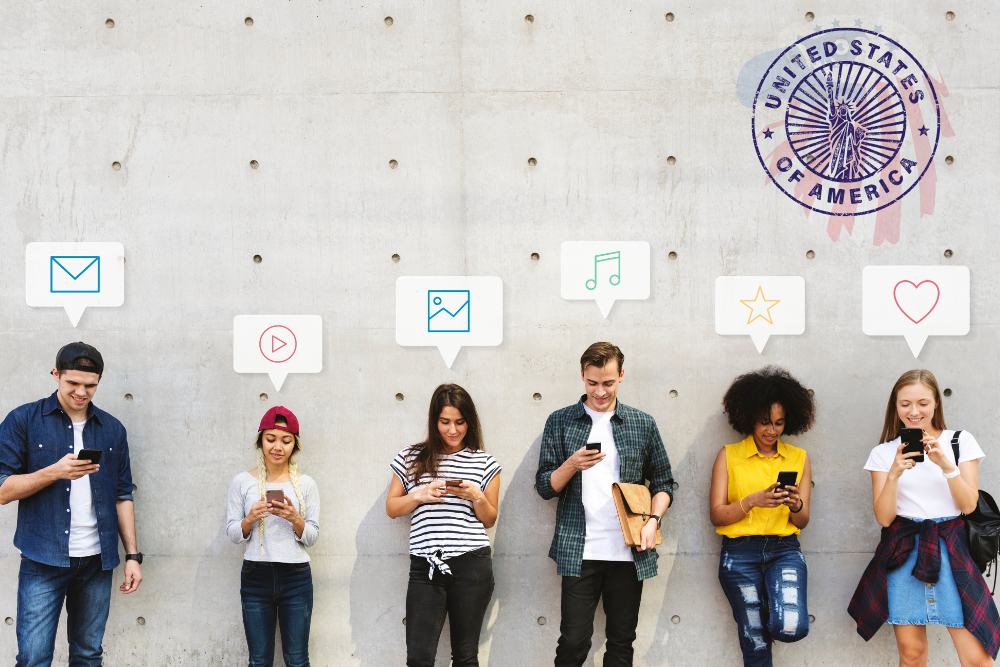In today’s digital age, social media plays a powerful role in shaping the experiences of international students in the USA. Platforms like Instagram, LinkedIn, TikTok, and X (formerly Twitter) are more than just social outlets—they influence academic decisions, cultural adaptation, career opportunities, and even visa outcomes.
While a thoughtful post can boost networking and professional growth, a careless update can lead to serious consequences, including scrutiny from universities, employers, or immigration authorities.
In fact, a single post can alter a student’s future. With digital footprints under increasing surveillance by U.S. institutions and officials, students must be mindful of how they present themselves online.
This article explores the dual impact of social media on international students, offering both opportunities and risks, and highlights the importance of maintaining a responsible online presence.
How Social Media Is Shaping the Future of Students in the USA
Admissions Decisions Now Include Your Digital Footprint
A significant number of universities are now paying attention towards the students’ social media activity who are planning to pursue their education in the USA. Checking their online presence or what activities they are involved in through an online platform has become an indispensable part of the admissions process.
Along with academic excellence, for a better and intensive understanding of students’ character and conduct, admissions officers often review social media profiles. If they find any inappropriate content, offensive remarks, or participation in divisive online discussions, it can result in the refusal or withdrawal of admission offers.
For instance, there have been many widely publicised incidents, which have shown that even older posts can reemerge, and will have adverse effects on a student’s chances of taking admission in universities in the USA.
Visa Approvals at Risk Due to Online Behaviour
Social media activity can have the worst outcomes, especially for international students. It has become an integral part of the visa application and renewal process, so the US Department of State and Immigration Authorities have heightened their review of social media accounts.
Online posts considered as politically delicate, controversial, or in violation of US laws and policies can result in visa rejections, revocations, or even deportation. The ever-increasing use of AI (Artificial Intelligence) in checking online activity has further increased the likelihood of danger, requiring greater caution in the digital space.
Job Prospects and Internships Affected by Your Online Image
Career opportunities can also be influenced by social media posts. Many employers carry out background investigations that expand to cover social media accounts, screening individuals according to their internet presence. Unacceptable content and derogatory remarks, or proof of misconduct, can cost candidates job opportunities, withdrawn job offers or potential dismissal.
Students who look for competitive industries to work in must be aware that their virtual identity can be equally crucial as their professional qualifications.
Legal Consequences and University Disciplinary Actions
In addition to educational and professional consequences, social media conduct can trigger both legal consequences and disciplinary responses. Universities implement stringent ethical standards, and posts breaching these instructions may result in disciplinary hearings, suspensions, or expulsions.
In addition to this, students involved in cyberbullying, harassment, or making threats online can face judicial penalties, resulting in criminal charges or lawsuits.
Smart Social Media Habits for International Students
To ensure the safety of their future, students must develop mindful social media practices. This includes consistently checking privacy controls, not being a part of conflicts and controversial discussions, and avoiding sharing and participating in unpleasant and questionable content.
A positive and professional presence can be a major factor for academic excellence and career prospects, whereas careless online actions can turn out to be harmful.
In the era of digitalization, where one nation is connected with another, social media is not only a platform for self-expression, but also a digital record that can shape a student’s future. From university admissions and visa approvals to job opportunities and legal consequences, every post, like, and comment carries plausible consequences. As technology advances so rapidly, students must exercise caution and foresight to ensure their digital footprint aligns with their aspirations.






